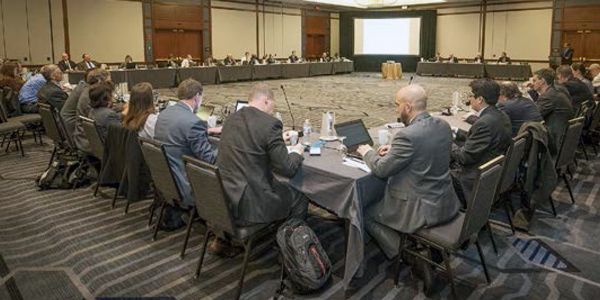The New England Power Pool filed a proposal with FERC on Monday to codify its unwritten ban on press attendance at stakeholder meetings (ER18-2208).
The proposed amendments to the NEPOOL Agreement add a definition of “press” and bar anyone working as a journalist from becoming a NEPOOL member or alternate for a participant.
New England is the only one of the seven U.S. regions served by RTOs or ISOs that prevents press coverage of stakeholder meetings.
NEPOOL’s Participants Committee approved the press ban June 26 with 79% in favor in a sector-weighted vote. An alternative proposal that would have made the press eligible for a non-voting membership failed with only 27% in support, with only the end-user sector strongly in support. (See NEPOOL Votes for Press Ban, Discusses Fuel Security.)
RTO Insider prompted the vote by having reporter Michael Kuser, who lives in Vermont, apply for committee membership as an end-user customer in March. NEPOOL has not acted on the application.
NEPOOL’s filing says that permitting press to become a participant or to represent a participant “would adversely impact NEPOOL’s ability to continue to foster candid discussions and negotiations in its stakeholder meetings. Without such discussions and negotiations among its members, ISO New England Inc. and state officials, NEPOOL would be limited in its ability to narrow or resolve complex issues within the NEPOOL stakeholder process. This could have the effect of increasing the issues and scope of litigation at the commission on ISO-NE Tariff changes and related matters before it.”
It cited concerns that press attendance at meetings “could encourage public posturing, pre-scripted statements and reduced willingness or ability by members to freely explore ideas or solutions.”
The filing notes that FERC ruled in a 2001 order that the NEPOOL Agreement is not a FERC tariff but “a supporting document … [and the] equivalent of a utility’s Articles of Incorporation.”
While it relieved NEPOOL of filing the agreement in tariff form, the commission said the organization must continue to file proposed changes to the agreement with the commission. “The commission will continue to review the proposed changes that fall within its authority under the [Federal Power Act],” the commission said.
NEPOOL said the commission is in “‘an essentially passive and reactive’ role’” and can only reject the filing if it finds the changes not “just and reasonable.”
“Thus, if the commission determines that a provision that precludes press from becoming a NEPOOL participant or participant representative falls within its authority, it can only reject that provision if it concludes that the changes are unlawful,” it said. “The commission’s review does not extend to the question of whether there are other reasonable approaches to the press membership issue.”
NEPOOL requested the change take effect Nov. 1.
RTO Insider began covering PJM stakeholder meetings in early 2013 and expanded coverage to stakeholder meetings of MISO and NYISO in late 2014, SPP in early 2015, and ERCOT and CAISO in 2016. RTO Insider also began covering ISO-NE in late 2014 but has been barred from all stakeholder meetings except for the Planning Advisory Committee, which is run by the RTO.
— Rich Heidorn Jr.





